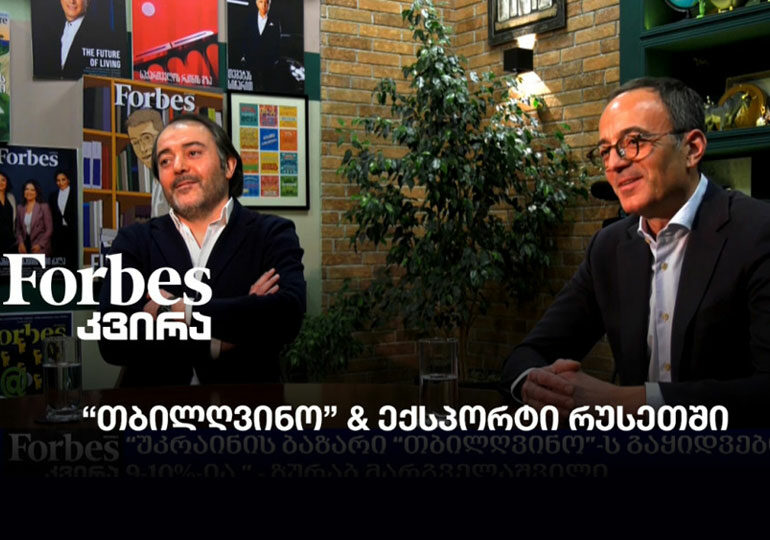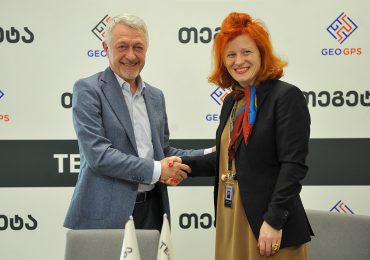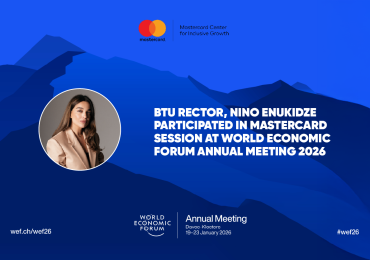Over the years, there have been several challenges for the wine industry at once. However, the fact is that exports are still growing. What is the situation in the industry today?
Giorgi Margvelashvili: Today and for many years now, the wine industry is facing one big challenge. This is called excessive dependence on one market.
We are talking about the Russian market…
Yes, in this case, the Russian market, but no matter what you call the market if you do not have the political and economic risks that characterize this particular market, in any case, such an excess dependence on one market is unhealthy. So the challenging sector must somehow try to overcome this to have some sort of balance between its supply markets. How should this happen…
The temptation is great…
Giorgi Margvelashvili: Yes, the temptation is great and it allows one to relax. When there is a great demand from one market, the industry becomes dull and no longer looks for new opportunities. It should also be noted that the quality of Georgian wine has risen to a fairly high level over the years and our wines meet high-quality standards. We and our competitors participate in international competitions every year and receive awards. Accordingly, Georgian winemakers have acquired the competence to produce high-quality wine. What lags is the knowledge of penetrating new markets, establishing a place, studying local trends, and paying more attention to other markets. We know how to make quality, decent wine, but we lack the information to find new markets and establish our place there. As a result, over-reliance on one market can be reduced. If we do not accumulate competence, we will not become more international, we will not study the market trends in the world. We will be left with this challenge insurmountable.
In almost all your interviews you talked about the sales edge, which made the Russian market risky, on the other hand, taking the example of “Tbilvino”, constantly talking about this risk and self-restraint – this is the temptation that George was talking about if it is an equilibrium – how do we acquire equilibrium?
Zurab Margvelashvili: When the export of Georgian wine to Russia was banned in 2006, our sales were much lower than today. 50% of all sales came from Russia, so due to the embargo, we lost 50% of sales and revenues. It was such a big blow that it took us about 2 years to get out of this situation. 2006-2007 were the years we questioned the company’s ability to exist. This period was so hard to overcome that in 2013 when the Russian market reopened for Georgian winemaking, we decided that our dependence on sales and revenues in Russia should not be higher than 30%. To date, we have adhered to this principle and this has led to our attitude in this market, which is not high. The temptation was always there because huge tenders and orders were coming. This attitude, however, is not healthy in any market. It also helped that after 2006 we started actively working on diversification. This is facilitated by the production of our high quality, in-demand and competitive product. As a result, today, “Tbilvino” depends on the Russian market by 20-22%.
How has the invasion, which started on February 24 changed the reality? What can be said about the effects of current events on “Tbilvino”?
Giorgi Margvelashvili: The current situation has changed the fact that this market has become completely unpredictable due to the political and economic risks that have reached their peak. Consequently, because of this unpredictability, we have decided to suspend all economic relations with Russia.
Can we say that “Tbilvino” has completely suspended its relations with Russia?
At this stage, yes…
Is the decision final or is it temporary? What does it depend on to change this decision and what circumstances can turn the company towards the Russian market?
If we do not take this step and do not sever economic relations with Russia, we do not know what will happen economically, as well as in terms of reputation. Therefore, as long as unpredictability continues, this decision will remain in force. We don’t have the means to say about the duration of the current situation, as it depends on the development of events.
With this decision, what guarantees have the company refused?
Zurab Margvelashvili: For us, it comes down to about 1 – 1.3 million bottles of wine.
During the conversation, you often mentioned the topic of teamwork. The company’s decision wasn’t based on an emotional response. Where will the company direct its resources, freed from the Russian market? Have you made any decisions in this regard?
Zurab Margvelashvili: This is a minimally emotional decision. For the last month or so, we have been intensively discussing this issue with our team. “Tbilvino” has a strong team that has competence and trust among its consumers. This is a very important and challenging period for us.
We are motivated to redirect our temporarily freed resources to other markets by using our knowledge and experience. We have several projects aimed at the development of the company. These are quality control systems like improving corporate governance, increasing production capacity, and cultivating vineyards – these projects will not stop. We believe that we can tackle this challenge with dignity with the help of our team.
Are there specific countries where demand can lead to an increase in your wine sales?
Giorgi Margvelashvili: I would like to elaborate that the team is quite mobilized and we made a unanimous decision. Together we realized this is the stress we have to go through to find new opportunities.
As for new opportunities, the first aim is to focus on stable markets, where we have very strong partners. These are Kazakhstan, the Baltic states, and Poland, countries with whom we are in intensive communication to find additional opportunities to enhance the annual plans we set last year.
The next step is to focus on other markets, where so far, we are represented on a relatively small scale. However, we have partners and we want to increase representations. In addition to existing or new partners in markets where we are not strongly represented, we need to expand more. These are the UK, US, Germany, and Asian markets. There are still completely new markets beyond the 30 countries where we are today. In these markets on the world winemaking map, Georgian wine is not presented in the form of “Tbilvino”. This is an untapped opportunity. Our managers work hard to master these markets.
What is the share of Ukraine at present as well as your plans?
Zurab Margvelashvili: This crisis has temporarily made us lose touch with Ukraine, but we believe that we will return there soon. In numbers, the Ukrainian share in our sales currently stands at 9-10%. Now is the time for thoughtful, emotional, and extraordinary decisions.

















